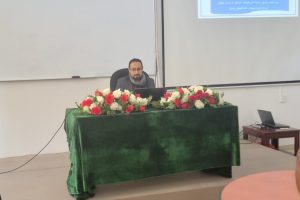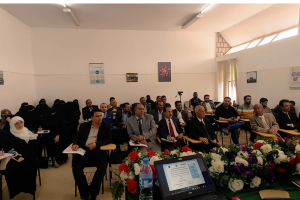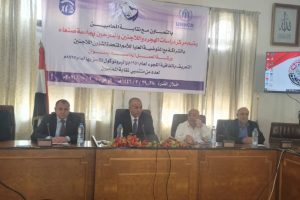In partnership with UNHCR the MRISC held “The World Refugee Day Anniversarys” which was attended by officials from Sana’a University , UNHCR and Faculty of Sharia & Law, and at the event Dr. Al qassim Mohammed Abbas Rector of Sana’a’s University praised the meeting on this day to emphasize its particular importance to our students and researchers, in particular graduate students of MRISC.
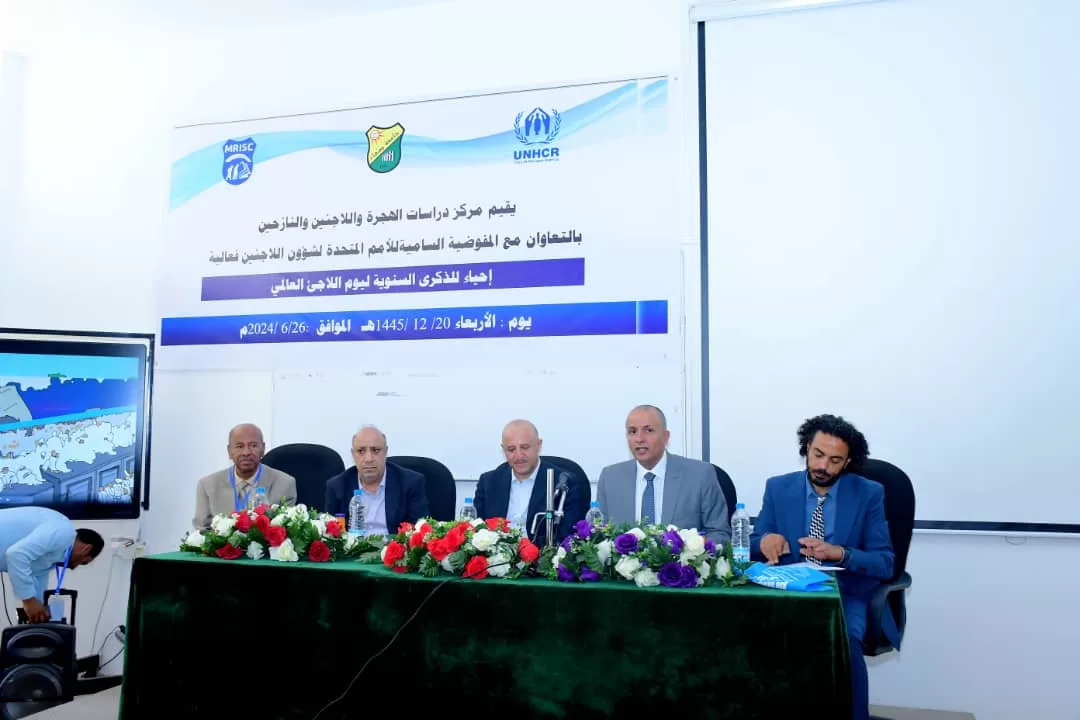
Report on The World Refugee Day – 2024
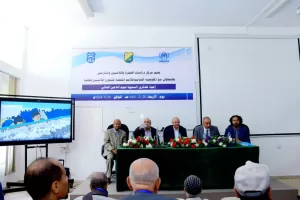
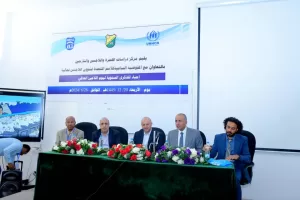
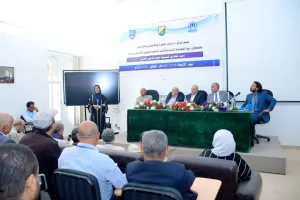
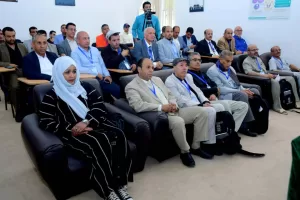
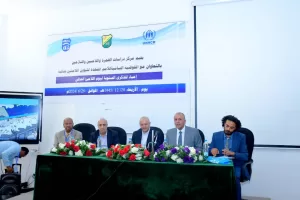
He added that many are surprised that Yemen is a destination for migrants and refugee, Is it really a destination or target or is it a path that is not stable and this subject is of great importance and should be deliberated by researchers, The Centre has embraced approximately 4 batches in the master’s programme specializing in migration, asylum and displacement issues, including the fullest discussion of the master’s thesis in this field. From this point of view, I would like to refer to humanitarian partners, whether UNHCR or international migration, to pay great attention to this specialization, especially research messages. Such centres are limited, especially in the Arab region. The Gulf States and the Horn of Africa must therefore undertake such research and lay out their outputs as a road map for cooperation in solving such phenomena. Thus, humanitarian partners will receive free research in this area. We wish their cooperation to achieve results that contribute to the solution of problems and challenges, and we get results through which we obtain mechanisms to protect those who are exposed to various forms of risks and threats, from which we must study and draw conclusions and recommendations, whether in academia or in cooperation with humanitarian partners, which give great importance to this aspect.
In this day, we must look forward to what is happening in Palestine, especially Gaza, where international law has stopped unable to do justice to our people and children in Gaza and the West Bank. (UNRWA) has been targeted and thus it has become clear to the world that humanitarian workers do not have the capacity and voice to be heard in front of the war machine, imperialism and enlargement that claims to support human rights in return. We are proud of the Government’s engagement and cooperation with the refugee community in Sana ‘a, and how do they actually get care in all respects and as a matter of responsibility this center must continue to be researched scientifically in this aspect. The aspect of displacement must also receive high attention, as aggression is still ongoing and daily there is targeting of civilians in our country leading to daily displacement. This should receive attention from researchers, as well as a (rapid response) of humanitarian partners that we call upon and will demand now and in the future, because displaced persons receive assistance only after the end of the displacement and are absorbed into Yemeni society, we hope that there will be a (rapid response) in this area.
In conclusion, I would like to thank all those present and to commend this academic momentum on this day. This demonstrates the interest of researchers and academics in these topics, which represent a rich and multifaceted research environment. Dr. Ahmed Al-Emad, Director of MRISC, and Faculty of Shari ‘a and Law, represented by a. Dr. Mohamed Saad Nejad, Dean of the Faculty and the High Commissioner of the United Nations (UNHCR), represented by Mr. Yassin Abbas, Head of UNHCR’s Protection Department and all attendees.
Dr. Ahmed Ali Al-Emad – Director of the Center for Migration, Refugees and Displaced Persons Studies at Sana ‘a University explained that on this International Day, we are proud to be one of the pioneers of this outstanding humanitarian work, which is the celebration of World Refugee Day through the existence of this Centre and its renowned activity under the auspices of the University of Sana ‘a and the cooperation of the Deanship of the Faculty of Sharia Law at the University. This is only proof that we are indeed interested in this humanitarian and refugee activity and it is not related to a particular day in the year. This distinctive scientific edifice, with the attention of the Presidency of the University of Sana ‘a, reflects their interest in the issue of refugees in Yemen. We are the only country within the geographical framework of the Arab Island and the Gulf that has joined this Convention despite all the difficulties, challenges and problems facing Yemen. Dr. Al-qasim Mohammed Abbas, President of Sana ‘a University, attending this event is the biggest evidence of its importance. This interest is reflected for the first time in the history of Yemen and Sana’ a University. Under the guidance of the Rector of the University, Sana ‘a University has embraced hundreds of refugees with free grants.Even the UNHCR gave up its duty towards them, It has previously been covering refugee scholarships, but it has stopped over the past years, but now Sana ‘a University carried out this role under the guidance of the Rector of the University, which doubled the number of grants of approximately 150 seats in various disciplines and without any fees, whether from stakeholders or donors. This was all within the framework of religious and moral duty towards the category of refugees present in Yemen. All thanks and appreciation to you for this dignified initiative, and your attendance at this event, He also thanked UNHCR, the Centre’s other wing from the very first moments of its founding a decade ago. Their keenness to continue partnering with the Centre despite all the challenges and difficulties faced by the country. We are proud of this partnership and we look forward to its strengthening, especially with regard to supporting research and postgraduate studies. As a result of the high demand for this specialization, we wish UNHCR to allocate support to this programme so that students do not go to other disciplines to find more effective employment opportunities in the field. We are currently keen to complete the previous payment, which has embraced approximately 150 students for three consecutive payments, including those who discussed the master’s thesis after completing their diploma studies.
All thanks and appreciation to UNHCR, represented by Mr. Yassin Abbas, Head of UNHCR’s Protection Department, and it’s his first visit to the Sana ‘a’s University. We cherish all those present today to launch the anniversary of World Refugee Day. Dr. Mohammed Saad Najad, who has also been constantly following up on all the requirements and facilities that have made this center a distinct one, and we hope to see a qualitative shift in the coming days, thanks and appreciation to all without exception.
The event was interspersed with UNHCR’s reportage on refugee rights in Arabic and provided for in the 1951 Refugee Convention. After the reportage there was a speech of refugees which it was entitled by “Success, not just success” delivered by a refugee student at the initiative of the Voice Refugee Platform In her speech, she thanked Sana ‘a University for granting scholarships to refugees, She thanked the Yemeni people and their leadership for hosting the Centre on this distinguished day and for its constant and sustained awareness of the community in its various institutions of refugee issues and international laws and conventions dealing with refugee issues. We thank UNHCR for providing different services to all refugees of different ages and in different aspects such as their sustainable development. I am very pleased to have a voice, especially in this place. (Centre for Migration, Refugee and Displaced Persons Studies), which has established and revives this event annually.
In her speech on the situation of refugees and their needs and the pressures they faced in all areas, particularly in the area of education, she appealed for the empowerment of young people in the refugee community, as their empowerment would greatly contribute to young people adding to themselves, to the refugee community and also to the host community.
Finally, the student sent a message to every refugee, saying: “I would like to send a message to every refugee, that being a refugee does not at all mean that you will hold this quality as you live, but it is a stage that you are able, and you can, and try again and again and three, and face all the challenges that you are going through.” I hope you got the message and thank everyone for listening.
In conclusion, it was the speech of Dr. Mohammed Saad Najad – Dean of the Faculty of Shari ‘a and Law where he initiated his welcome to all attendees, especially from the transfer of the smell of Palestine beloved Mr. Yassin Abbas, Head of UNHCR’s Protection Department, who lives with us in our minds, hearts and blood and is subjected to the greatest human crime of extermination. All the crimes we have known throughout history have been read about in books and history . What is happening in Palestine is a massacre directly in the eyes of the entire world without blinking an eyelid .
Before I talk about World Refugee Day, which is 20 June every year, The solemn and great occasions for which a day is set to commemorate, are not intended for humanitarian review by States and organizations, But the purpose is that we remain in constant thinking in this category, we alert society to its suffering and focus on this human tragedy because of the persecution of human beings or other causes of a group of people whose fates and circumstances have necessitated the dominance of evil forces and aggression in this brutal world, leading to such a phenomenon in which people are forced to take refuge or move in search of safe places to live. So the celebration of this day is for these noble ends which are supposed to be an inherent part of the humanity of mankind and I believe that all attendees are very conscious.
I will speak today from an academic standpoint, considering that this is the participation of the Faculty of Shari ‘a and Law in this event and with regard to its position and support for this category of laws, conventions, protocols and humanitarian treaties. Many countries boast and claim to be the patron of human rights, we are also here in the academic aspect of the Faculty of Shari ‘a and Law From the directives of the state in general and then the directives of the Presidency of Sana ‘a University, and also what the scientific and academic side imposes on the college was one of our first contributions was to start the idea of establishing this center (The Migration and Refugee Studies Centre)which was later added the name “Displaced Persons”, a qualitative academic centre whose main purpose is to deal with refugee studies of all kinds and to develop solutions for them.
We at the Faculty of Shari ‘a and Law made a great effort to offer everything possible. To that end, we have contributed very significantly, not from us, but as a duty to make this center a success and its tasks that can contribute to solving the refugee problem, especially the study and research side of the center. The MRISC has moved a paradigm shift within five years and has offered distinguished and diverse studies, which is a great step from the opening of the master’s and doctoral programme.
We have tried very hard to transfer and incorporate vocabulary from international humanitarian law and asylum law in particular into the faculty of sharia law, especially in the faculty’s department of public international law, as it is more relevant to the suffering and studies of refugees. We have held a series of seminars and workshops in which insights and studies have been provided in order to incorporate such vocabulary into the faculty of sharia and law, It could have been in a separate article, but we have seen it incorporate it, although it is neither the detail we want nor the academic quality we seek with the Centre. The workshops have therefore proposed a series of solutions, visions and studies that attempt to integrate the vocabulary of refugee care and rights within the framework of general international law, as well as in the subject of international organizations, we are continuing to strive and renew our call to the UNHCR fraternity to revive those workshops and support the Centre to convey those developments, complement the workshops, and present a vision for the College to re-characterize the College’s programme, in particular the subject of public international law and the subject of international organizations. Dr. Al-Qasim Mohammed Abbas was an incubator of this center and has responded to all theses and studies on refugees, their issues and challenges that confront them only and has responded to them, and In cooperation with Dr. Ahmed Al-Emad – Director of MRISC who offers very large initiatives, In cooperation with UNHCR, we will do better, God willing, and we stand by, support and support the Centre. UNHCR must renew its support for these constructive initiatives in order to bring them into practice. As we are a part of the Islamic nation and part of the global system, we focus on the issue of Palestine refugees who have for 70 years and the Palestinian citizen is a refugee and then his children come and they are also refugees. This is a great tragedy that has not happened in history. Their suffering must be highlighted. We, as academics, intellectuals, scientific elites and intellectuals, must show the world their suffering.
In conclusion, I would like to thank everyone for their presence and wish you all well. The attendance of the officials was a qualitative addition, where everyone spoke and responded to interventions and observations by the participants, and the session lasted three consecutive hours.

